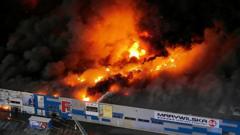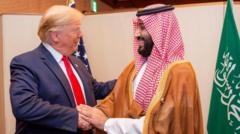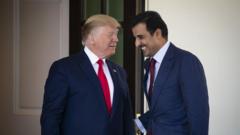In a bold move, Ukrainian President Volodymyr Zelensky has put forth an invitation for Russian President Vladimir Putin to meet in Istanbul on Thursday, following pressure from former U.S. President Donald Trump advocating for negotiations. Zelensky's proposal comes as both nations face the pressing need for a ceasefire amidst ongoing conflict. The dialogue echoes collaborative efforts from Western leaders who recently discussed strategies to halt hostilities.
Zelensky Invites Putin to Istanbul Talks Amid Trump’s Calls for Dialogue

Zelensky Invites Putin to Istanbul Talks Amid Trump’s Calls for Dialogue
Ukrainian President Volodymyr Zelensky expresses readiness for direct talks with Russia, reflecting a growing urgency for resolution.
Zelensky's post on X declined to prolong the ongoing violence, stating, "There is no point in prolonging the killings." His open invitation followed Trump's prompt, urging Ukraine to engage with Putin immediately to clarify the situation and explore potential resolutions. Although Zelensky remains optimistic about a ceasefire before talks commence, Putin's previous remarks emphasize a more complex landscape, where any negotiation must also consider Western military support to Ukraine.
Moscow, meanwhile, has indicated prerequisites to any ceasefire agreements, complicating hopes for immediate results. The recent coalition of European leaders, who met with Zelensky to discuss strategy, has called for a 30-day pause in fighting as a prerequisite for advancing talks. Their unified stance insists that new sanctions will follow if Russia does not comply.
As with previous negotiations held in March 2022, the intricacies of achieving tangible agreements remain fraught with challenges. While both parties are seemingly willing to discuss, divergent demands and conditions signify that finding common ground is still a formidable task. With tensions high and military actions ongoing, the world will be closely watching this pivotal moment in the conflict.
Moscow, meanwhile, has indicated prerequisites to any ceasefire agreements, complicating hopes for immediate results. The recent coalition of European leaders, who met with Zelensky to discuss strategy, has called for a 30-day pause in fighting as a prerequisite for advancing talks. Their unified stance insists that new sanctions will follow if Russia does not comply.
As with previous negotiations held in March 2022, the intricacies of achieving tangible agreements remain fraught with challenges. While both parties are seemingly willing to discuss, divergent demands and conditions signify that finding common ground is still a formidable task. With tensions high and military actions ongoing, the world will be closely watching this pivotal moment in the conflict.





















